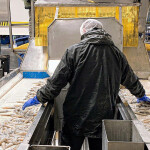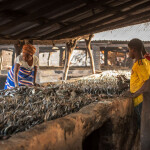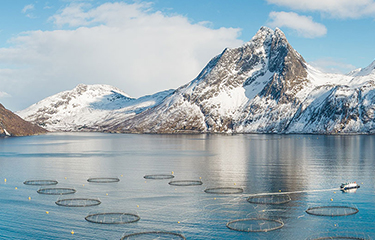SalMar recorded large increase in revenue and earnings before interest and taxes (EBIT) year-over-year, boosted by high salmon prices and lower costs.
The Frøya, Norway-based salmon-farming company posted revenue of NOK 6.79 billion (USD 635 million, EUR 585 million) in Q1 2023, up from NOK 4.68 billion (USD 437 million, EUR 403 million) in Q1 2022. The company also saw a significant increase in its operational EBIT year-over-year, reaching NOK 1.88 billion (USD 175 million, EUR 162 million), up from the EBIT of NOK 1.26 billion (USD 117 million, EUR 108 million) it posted in Q1 2022.
The company harvested 48,500 metric tons (MT) of salmon in the quarter, achieving an operational EBIT-per-kilogram of NOK 38.80 (USD 3.63, EUR 3.34).
The company’s Norwegian operations posted an operational EBIT of NOK 1.72 billion (USD 160 million, EUR 148 million) and a total harvest volume of 42,000 MT. That total is split across two segments in the country: Fish Farming Central Norway and Fish Farming Northern Norway.
In central Norway, the company had operating revenue of NOK 2.3 billion (USD 215 million, EUR 198 million) in Q1 2023, up from NOK 1.9 billion (USD 177 million, EUR 163 million) in Q1 2022. The company’s operational EBIT also increased to NOK 1.1 billion (USD 102 million, EUR 94 million), up from NOK 925 million (USD 86 million, EUR 79 million). Central Norway also harvested 22,200 MT of salmon, with an EBIT per kilogram of NOK 50.00 (USD 4.67, EUR 4.31).
“The segment delivered strong results in the period, driven by high salmon prices, lower cost level, and a favorable harvest profile,” the company said.
The company’s Fish Farming Northern Norway segment also posted a positive performance, reaching revenue of NOK 1.8 billion (USD 168 million, EUR 155 million) in Q1 2023 compared to NOK 1.2 billion (USD 112 million, EUR 103 million) in Q1 2022. The company’s operational EBIT also increased to NOK 837 million (USD 78 million, EUR 72 million), up from NOK 716 million (USD 67 million, EUR 61 million), with an operational EBIT per kilogram of NOK 42.30 (USD 3.95, EUR 3.64) for the 19,800 MT of salmon harvested.
“The segment expects a lower cost level and lower volume in the second quarter 2023,” SalMar said.
The company’s “Sales and Industry” segment, which sells the fish the company harvests in Norway, also posted an improved performance in Q1 2023 compared to the previous year. The company posted operating revenue of NOK 6.2 billion (USD 580.1 million, EUR 534.6 million), up significantly from NOK 4.4 billion (USD 411 million, EUR 379 million) it posted in 2022. The company also recorded a better operational EBIT, losing NOK 81 million (USD 7.5 million, EUR 6.9 million) versus a loss of NOK 372 million (USD 34.8 million, EUR 32 million) in 2022.
However, the company said high spot prices for salmon led to a negative contribution from fixed-price contracts.
The company’s Icelandic Salmon segment also posted higher revenue, operational EBIT, and harvest volumes. The company posted revenue of NOK 764 million (USD 71 million, EUR 65 million) in Q1 2023, up from NOK 368 million (USD 34 million, EUR 31 million) it posted in Q1 2022, and its operational EBIT more than doubled from NOK 94 million (USD 8.7 million, EUR 8.1 million) to NOK 204 million (USD 19 million, EUR 17 million). Operational EBIT per kilogram increased to NOK 31.00 (USD 2.90, EUR 2.67) compared to NOK 28.00 (USD 2.62, EUR 2.41) last year.
“The rise in operating revenues related primarily to higher volume harvested and higher salmon prices than in the corresponding quarter last year,” SalMar said.
SalMar said Norway's current proposal for a resource tax on aquaculture is still a source of concern, and said that “despite the few minor adjustments” in the government’s latest proposal, it still opposes the tax.
“In its proposal, the government has neither addressed the concerns of those who create value on the Norwegian coast, nor reassured Norwegian and international investors who used to consider Norway as a stable and reliable country to invest in,” SalMar said. “The proposed tax is based on the assumption that the salmon industry generates excessive returns compared to the risk involved. SalMar argues that this is not accurate. SalMar strongly believes that the proposal should be permanently set aside, and its arguments remain valid for the updated version.”
Operationally, the company said construction of a new smolt facility is underway in Tjuin in Trøndelag, Norway, with the first batch of smolt “expected to transfer” in 2024. The company also said it has started construction of a new closed net-pen design, which will be put into operation during the summer of 2023.
SalMar is continuing its strategic review of Frøy, a Norway-based integrated aquaculture services firm . SalMar is the largest shareholder in the company, and the company said it is continuing to evaluate whether to sell its shares.
“Frøy’s board of directors has actively engaged in the strategic review with the aim of maximizing value for all shareholders in Frøy, and several parties have expressed an interest in engaging in a transaction including potential offers for the company’s shares,” SalMar said. “Based on the interest received, SalMar and Frøy are continuing the strategic review with the aim of maximizing value for all shareholders in Frøy.”
Photo courtesy of SalMar







